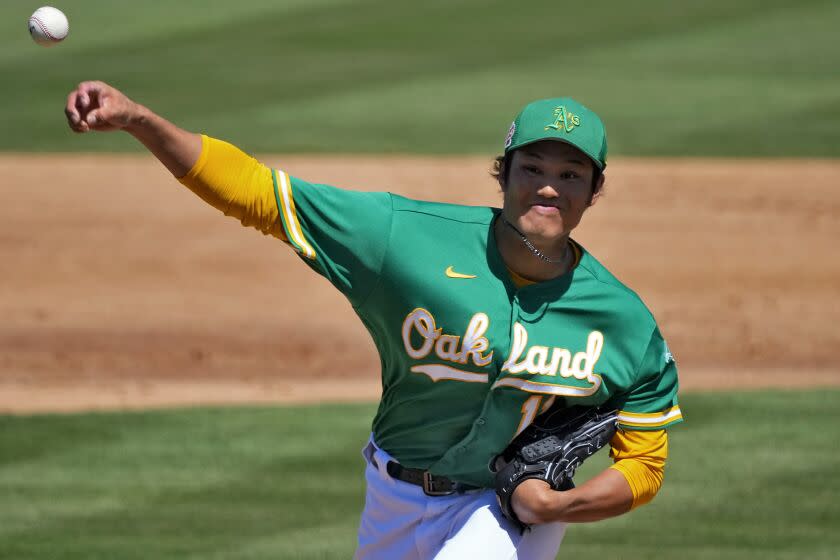Hernández: What happened to Shintaro Fujinami? Shohei Ohtani's old rival can't match Angels star

Standing on first base, Shohei Ohtani turned to the Angels’ dugout, raised his arms like Rocky Balboa and shook his hips like Shakira.
He won.
Ohtani contributed to turning his longtime rival’s major league debut into a national tragedy in their shared homeland, his bases-loaded single off the left-field wall at the Oakland Coliseum part of the Angels’ 11-run third inning.
The first eight runs the Angels scored in their 13-1 victory over the Oakland Athletics were charged to Shintaro Fujinami, a flamethrowing right-hander who was once considered Ohtani’s equal.
The meeting of Ohtani and Fujinami on the world’s greatest stage was anticipated from the time they were the two best young pitchers in the Japanese league — except this wasn’t how their showdown was expected to look like, with one of them recognized as the king of baseball and the other fortunate to have a place on the worst team in the majors.
A rivalry that started as Japan’s version of Magic Johnson and Larry Bird is now about as competitive as the Battle of New Orleans.
Fujinami lasted just 2 1/3 innings against the Angels and gave up five hits and three walks. His earned-run average is 30.86. Ohtani was two for five with two runs batted in and a run scored.
“I was glad I was able to compete against the best players in the world, not just Ohtani,” Fujinami said in Japanese.
Ohtani, who was one for two with a run batted in against Fujinami, was equally reticent to talk about his compatriot.
“I didn’t see that many pitches,” Ohtani said in Japanese. “I think the sample size was too small for me to comment.”
Ohtani and Fujinami first met at Japan’s national high school baseball tournament in spring 2012, at which Ohtani played for Hanamaki Higashi and Fujinami for powerhouse Osaka Toin.
Ohtani homered against Fujinami, but Osaka Toin crushed Ohtani for nine runs on its way to a 9-2 win. Osaka Toin went on to claim the national title and defended its championship in the summer version of the tournament.

Ohtani and Fujinami later played together for Japan’s under-18 national team and were part of the same Nippon Professional Baseball draft class. Ohtani, who initially looked as if he was set to sign with the Dodgers, went to the Nippon-Ham Fighters. Fujinami was selected by the Hanshin Tigers, who play in Koshien Stadium, the home of the national high school championships.
With Ohtani trying to find his way as a two-way player, Fujinami had a better start to his career. Even when Ohtani emerged as a bona fide star, Fujinami was considered just as good a pitcher, perhaps even a little better.
“They were 1-A and 1-B,” said a major league talent evaluator, who spoke under the condition of anonymity because his team doesn’t allow him to share his observations.
When Ohtani and Fujinami faced each other in high school, it was Ohtani who had control problems. Ohtani walked seven and hit four others in that game; Fujinami walked only two.
The trend reversed when they became professionals. An incident early in the 2015 season foretold the troubles to come. In a game against the Hiroshima Carp, Fujinami faced Hiroki Kuroda, who returned to play for the small-market team after a decorated seven-year run with the Dodgers and New York Yankees. Kuroda squared up to bunt and Fujinami knocked him down. Kuroda squared up to the bunt on the next pitch and Fujinami knocked him down again. Kuroda screamed at Fujinami as he advanced toward him. The benches cleared.
The command problems worsened. Fujinami, who was a combined 35-21 in his first three seasons with the Tigers, regressed. He sometimes pitched in relief. He was sent to the minors in each of his final six years in Japan.
Still, in a country in which the most popular sporting event is the national high school baseball tournament, Fujinami remained a big-name player because of his heroics at Osaka Toin. He was Japan’s answer to Tim Tebow.
Meanwhile, major league teams remained interested in him because of his upside. He might not have known where the ball was going, but he could still register triple digits on the radar gun.
The good and the bad of Fujinami were on display Saturday when he pitched for the first time for the Athletics, who signed him to a one-year, $3.25-million contract.
With his mother, Akemi, in the stands of the dilapidated stadium with her hands clasped in prayer, Fujinami was perfect through two innings, striking out four. He forced Ohtani to ground out in the first inning.
“He was splendid at the start,” Ohtani said.
However, Fujinami unraveled after walking Luis Rengifo to start the third inning. Later in the inning, with the Angels ahead 2-0, Fujinami faced Ohtani with the bases loaded. The second pitch of the at-bat was a high 99-mph fastball on the outer part of the plate. Ohtani casually slapped the ball the opposite way and nearly cleared the left-field wall, settling for a long run-scoring single.
By the time Fujinami was removed from the game, the Athletics were down, 6-0. Reliever Adam Oller allowed two of his inherited runners to score.
The gap between Ohtani and Fujinami was even wider now than it was before the game.
This story originally appeared in Los Angeles Times.

 Yahoo Sports
Yahoo Sports 
